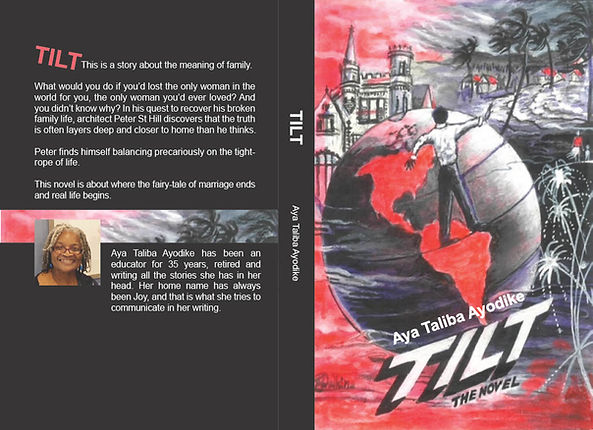
TILT: The Novel
TILT is a poignant novel that delves into the real-life challenges of marriage and family, beyond the fairy-tale ideal. It appeals to readers who are navigating their own relationships, as well as those interested in exploring the deeper truths about love, loss, and commitment.
This is a story about the meaning of family.
What would you do if you'd lost the only woman in the world for you, the only woman you've ever loved? And you didn't know why? In his quest to recover his broken family life, architect Peter St. Hill discovers that the truth is often layers deep and closer to home than he thinks.
Peter finds himself balancing precariously on the tightrope of life.
This novel is about where the fairy-tale of marriage ends and real life begins.


My Debut Novel


Reasons for writing Tilt:
To share and discuss relationship issues; that relationships are built on knowledge of the person through communication and observation; to explore the topic of human’s ability to love and how to learn how to love.
I am not a relationship expert, and I was not trying to pass myself off as one. What I attempted to show in Tilt is that love, understanding its nature, and learning to love, is the only foundation of all meaningful living.
Much of my realisation comes from my own personal struggles with not being able to love fully, and having moved from plenty hatred to somewhere closer to being able to love.

Short Stories
One of my short stories, ‘Better’ was long-listed for the Brooklyn Caribbean Literary Festival Contest 2024. ‘Better’ explores the realities of poverty and loss, as well as the innate dignity of human life.
BETTER
by
Aya Taliba Ayodike
Nogood crouched behind the berm that ran the length of Beetham Place. His stomach gnawed and writhed on itself. Still, his eyes were drawn to the display of fluorescent orange across the western sky. A larger-than-life, mellowed sun sank into the Gulf of Paria.
Billows of black smoke belched across the Beetham Highway, smothering the orange glow. The LaBasse landfill was burning. High up in the air, the corbeaux circled, downwind. The smoke thickened. Nogood choked, his eyes watered. The pain in his gut intensified. When last had he eaten?
Nogood’s real name, Kwame, meant ‘problem-solver’. Well now, he had the biggest problem of his life to solve. In all of his twelve years, his mamma had provided everything. Every night, smiling, he rubbed his full belly as he drifted into a contented sleep.
Until yesterday…..
Nogood knew what death was. When vehicles speeding up the Beetham Highway injured unwary animals, he found them groaning, then their eyes glazed, finally they went rigid on the dirt shoulder where the car or truck had pitched them.
Well, his mother had groaned then glazed. He knew rigid was coming. He gave one loud, terrified scream. One. Then he clapped his hands over his mouth. What would he do without his mamma?
The next morning, Nogood gathered up his hand-me-down clothes into the one battered suitcase. He gulped down a belly-full of water at the nearby standpipe. Then he ran away before the authorities came, choosing to try his luck running with the pack of street boys.
He ventured west, daringly close to the Central Market. Here was hope. But his footsteps froze, his heart hammered in his chest. He turned away empty-handed, chicken-hearted, back to the safety of his hiding-place, until the pain in his gut made him scramble up. He had to find something to eat.
The Beetham street boys, the ten or twelve of them, what did they eat? He wanted to be part of that pack. He did not like, no, he was already tired of being alone, looking for crumbs.
He swallowed more water from another stand-pipe, and returned to his find, an abandoned hut. The night was still young. He hunched his back against the strongest-looking post. Images from his past circled his brain.
From the time he could walk, he was full of mischief. When his first blundering, childish attempts at trickery failed, the neighbours shook their heads.
“Boy, is a pity your father get kill on the Beetham. You need someone to give you a good cut-tail or you’ll come to no good!”
The bigger boys mimicked their elders, shouting, “Nogood. Nogood. Nogood”, roughing him up. The nickname stuck.
He stretched out on the hard ground and drifted into an uneasy sleep. Hunger had him by the loins.
A roiling gut forced him up early, pushed him to go in search of the street boys. Again, he drank as much water as he could hold before running helter-skelter the length of Main Street. He found them pow-wowing under the doungs tree.
The leader faced the group. He had their attention. Bois in hand, he swayed his thin, spare body, stabbing the ground for emphasis. To Nogood he looked as tough as nails. His voice, full of menace, held Nogood spellbound.

ALL Joy













